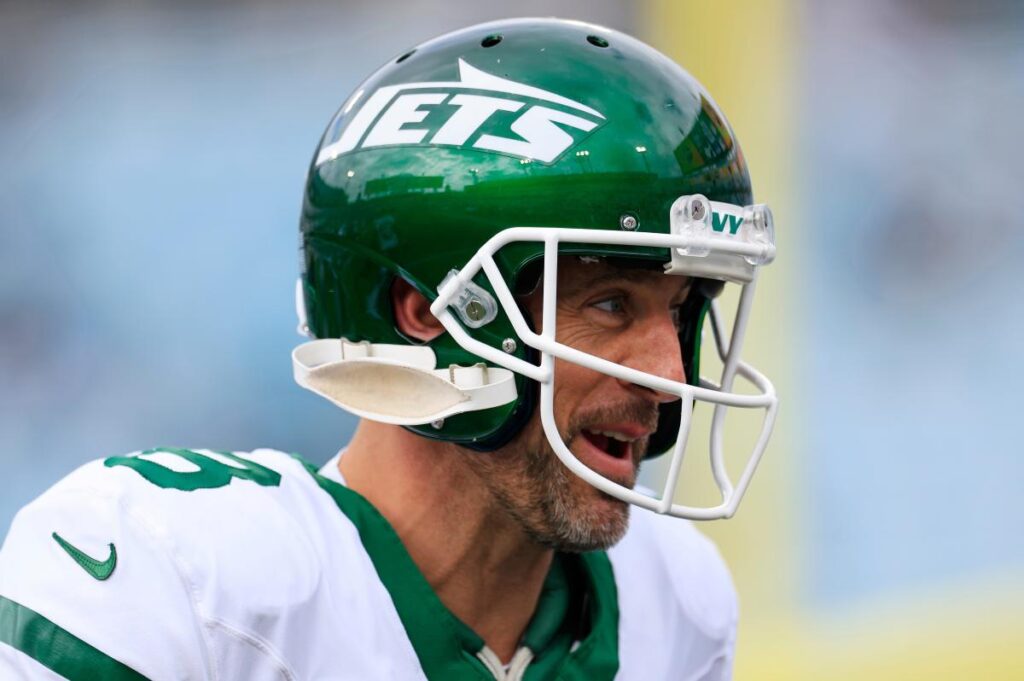The New York Jets recently ended a four-game losing streak with a hard-fought victory over the Jacksonville Jaguars, decisively winning 32-25. Quarterback Aaron Rodgers delivered an impressive performance, throwing for 289 yards and achieving three touchdowns without any turnovers, marking one of his best games of the season. Following the win, Rodgers appeared on “The Pat McAfee Show,” where he not only celebrated the Jets’ success but also took the opportunity to criticize the current state of sports media. He expressed concerns that many sports pundits display opinions that are “unfounded or asinine,” suggesting that these journalists have become more concerned with celebrity than with sharing informed insights.
The discussion around Rodgers’ remarks escalated after ESPN analyst Ryan Clark responded on the network’s “First Take.” Clark labeled Rodgers as “tone-deaf,” “unaware,” and a “fraud,” claiming that Rodgers himself is engaging in the very behavior he criticizes—making provocative statements for attention. This exchange of words highlights the growing tension between athletes and media figures, especially as Rodgers continues to voice his opinions publicly, further igniting scrutiny about his viewpoints on journalism and football commentary.
In his follow-up interview on “The Pat McAfee Show,” Rodgers elaborated on his views, emphasizing a need for transparency regarding sports commentators’ backgrounds, particularly their vaccination status, which he linked to perceived biases in their commentary. He suggested that media members should disclose their vaccination status alongside their credentials to provide context for their opinions. This remark, while not directly targeted at any single individual, reflects Rodgers’ broader frustration with the media’s treatment of him and the narratives constructed around athletes.
McAfee, who co-hosts the show, supported Rodgers’ position while also clarifying that he pays Rodgers for his appearances, a practice that sparked some controversy. Rodgers affirmed that he has not received any payment from McAfee this season, suggesting he values the platform for sharing his thoughts rather than financial gain. This point underscores the sometimes complicated relationship between professional athletes and media figures, where financial considerations can influence perceptions and motivations on both sides.
In response to Rodgers’ remarks, Ryan Clark took to social media to critique what he views as Rodgers’ hypocrisy, accusing him of engaging in similar behavior to the commentators he criticized. He called out the contradictory nature of Rodgers claiming to speak freely while being compensated for his appearances, suggesting that this undermines the credibility of his arguments. Clark expressed a desire to clarify his intentions with McAfee and to separate his comments about Rodgers from any feelings of jealousy regarding McAfee’s show and business model.
The unfolding drama between Rodgers and Clark highlights not only personal grievances but also larger themes within sports media regarding accountability and the authenticity of voices in the industry. As Rodgers pointed out, the longevity of an athlete’s career is often fleeting, and the current relevance of opinions might fade over time. He prompted journalists to maintain humility and integrity in their analyses, advocating for a more thoughtful approach to sports commentary. With the NFL season reaching critical junctures, the dynamics between players and pundits will surely continue to evolve, reflecting not only individual personalities but also the pressing issues surrounding media representation in sports.

